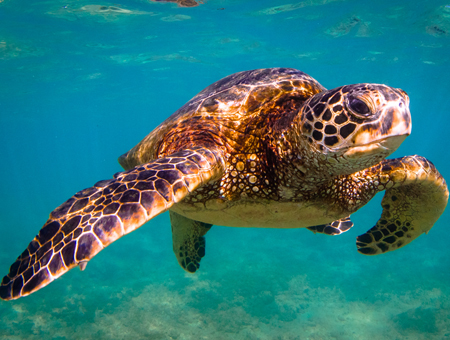Change in Mexican Sea Turtle Protection Laws
This year SEMARNAT, the Mexican Environmental Agency is coordinating the statewide sea turtle conservation campaign and the nesting season rules have changed significantly to protect sea turtles while also keeping human contact with our oceangoing summer visitors and their young to a minimum. The regulations state that trained security personnel must release the hatchlings, not guests. We know that this is something that many members look forward to, however, we must follow the rules. Failure to comply could lead to Royal Resorts losing the right to have turtle nurseries at the resorts or to be part of the turtle protection campaign.
We will keep you posted on the turtle protection campaign during the summer and are happy to report that there are now 22 nests in the turtle nurseries at The Royal Sands, The Royal Caribbean and The Royal Islander with 2,557 eggs (July 7). Seventeen of the nests contain eggs laid by green turtles and the remaining five have loggerhead turtle eggs. Four nests have also been reported at The Royal Haciendas in the Riviera Maya. The eggs were laid by a hawksbill turtle and three loggerhead turtles and were moved to a nursery further north.
The latest news from Grand Residences to the south of Puerto Morelos is that there are already four nests in the sea turtle nursery with 413 eggs. Two are green turtle nests, one is a loggerhead and the first is that of a leatherback turtle, the largest turtle in the world and a rare visitor to the coast of Quintana Roo.
Follow the Sea Turtle Nesting Season Rules
- If you spot a sea turtle on the beach at night alert the security staff
- Be very quiet and keep still
- Watch from a distance of ten meters (33 feet)
- Do not attempt to touch the sea turtle or crowd her
- Do not shine a torch or use the light on your mobile phone
- Please, no flash photography
- No smoking
- Follow the instructions given by security staff at all times
- Noise, lights and the movement of people may disturb a nesting sea turtle and startle her causing her to leave the beach without laying eggs. She may lay her eggs in the sea; just imagine over 100 precious turtle eggs lost because of noise, torchlight or people getting too close.
- Resort security staff will release the baby sea turtles at night to keep them safe from seagulls and frigate birds that are their natural predators. It is no longer possible for guests to handle the turtles and help set them free.
- If you spot a sea turtle when snorkeling or diving watch from a distance, do not swim towards it and do not attempt to touch it
- Sun products contain chemicals that harm marine life, pollute the water and damage corals. As an alternative, wear a t-shirt when snorkeling as protection from the sun instead of applying sun block.
- Help us to keep our beaches and sea clean. Sea turtles ingest plastic bags and other trash with fatal consequences, get tangled in fishing lines and nets and drown and have been found with injuries caused by discarded straws and plastic beer packaging.
- The sea turtle is protected by Mexican law and it is illegal to disturb or touch them, persecute or hunt them and consume their meat or eggs.

